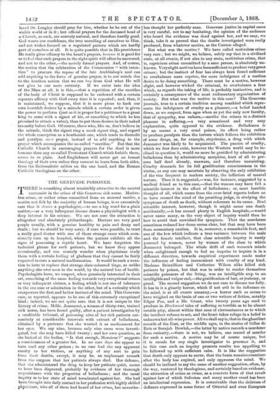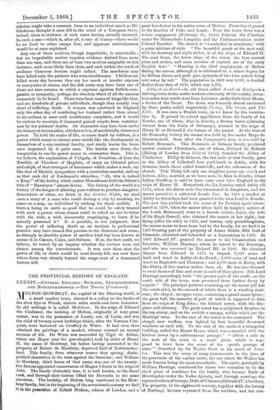THE GENEVESE POISONER.
THERE is something almost irresistibly attractive to the mental auatomist in the crime of this Genevese sick nurse. Motive- less crime, or rather crime committed from an unusual motive, a motive not felt by the majority of human beings, is so excessively rare that it draws a psychologist,—to use a big word for a plain matter,—as a very infrequent disease draws a physiologist with a deep interest in his science. We are not sure the attraction is altogether and absolutely philanthropic. Doctors are very good people usually, with a genuine hostility to pain and decay and death ; but we should be very sorry, if cure were possible, to trust a really good doctor with one of those strange cases which occa- sionally turn up in hospital, where the patient exhibits all the signs of possessing a reptile heart. We have forgotten the technical phrase for such patients, but we know they appear occasionally, aud can scarcely wonder when physicians study them with a certain feeling of gladness that they cannot be fairly expected to cure a natural malformation. It would be such a vexa- tion to have to replace that strange slate-coloured tinge, so unlike anything else ever seen in the world, by the natural hue of health. Psychologists have, we suspect, when genuinely interested in their art, something of the same feeling towards very exceptional crimes or very infrequent virtues, a feeling which is not one of tolerance in the one case or admiration in the other, but of a curiosity which overpowers the first and better instinct of the mind. This Genevese case, as reported, appears to be one of this extremely exceptional kind ; indeed, we are not quite sure that it is not unique in the history of crime. Mdlle. Jeanneret, a woman of thirty-two, trained sick nurse, has been found guilty, after a patient investigation by a creditable tribunal, of poisoning nine of her sick patients suc- cessively at considerable intervals with extract of belladonna, obtained by a pretence that she wanted it as medicament for her eyes. We say nine, because only nine cases were investi- gated, but she may have killed twenty ; and her own question, as she looked at the bodies, "Is that enough, Monsieur ?" suggests a consciousness of a greater list. In no case does she appear to have used any other poison ; in no case had she any apparent enmity to her victims, or anything of any sort to gain Irons their deaths, except, it may be, an unpleasant remark from the surgeon that her patients always died. Her defence, that she administered the drug to keep her patients quiet, seems to have been disproved, probably by evidence of her thorough acquaintance with the properties of belladonna ; and the usual inquiry as to her state of mind terminated against her. She had been brought into daily contact in her profession with highly skilled physicians, who all of them had heard a her crime, but neverthe-
less thought her perfectly sane. Genevese justice in capital cases is very careful, not to say hesitating, the opinion of the audience who heard the evidence was dead against her, and we may, we think, take it as proved that the deaths investigated were really produced, from whatever motive, as the Canton alleged.
But what was the motive ? We have called motiveless crime very rare ; but we might, we believe, safely say that in a civilized state, at all events, if not also in any state, motiveless crime, that is, capricious crime committed by a sane person, is absolutely un- known. Veryslight motives have beensufficient to produce verygreat crimes ; but the instinct of fear has always been found sufficient to overbalance mere caprice, the mere indulgence of a restless desire to be doing something. There must be a motive, however slight, and however wicked the criminal, to overbalance a fear which, as regards the taking of life, is probably instinctive, and is certainly a consequence of the most rudimentary organization of society. But what was the motive in this case? The Genevese journals, true to a certain tradition among mankind which repre-, sents the indulgence of cruelty as a pleasure,—a belief handed down, as we suspect, from ages when as yet the only new faculty, that of sympathy, was unborn,—ascribe the crimes to a distinct pleasure in suffering,—a very sensational and very easy explanation, quite opposed to the evidence. Belladonna is by no means a very cruel poison, its effect being rather to produce paralysis than the torture which follows the exhibition of some drugs, as, for example, strychnine, a drug with which Jeanneret was likely to be acquainted. The passion of cruelty, which we fear does exist, however the Western world may be in- clined to question it, would no more be gratified by administering belladonna than by administering morphine, least of all to per- sons half dead already, unaware, and therefore unresisting. Cruelty demands for its full gratification consciousness in the victim, as any one may ascertain by observing the only exhibition of the vice frequent in modern society, the infliction of mental torture. Then it is suggested,—was, for instance, suggested by a medical friend as to this case,—that the woman may have felt a. scientific interest in the effect of belladonna ; or, most horrible thought of all, which seems from the over-brief reports before us- to have crossed the mind of the presiding judge, in studying the symptoms of death as death, without reference to its cause. Real scientific interest, however, though it might cause one death, accidentally,—it has caused plenty in English hospitals,—would never cause many, as the very object of inquiry would then be to avoid that unwished-for symptom. That the murderess sometimes reduced her doses seems clear, but that may have been from momentary caution. It is, moreover, a remarkable fact, and one of the few which indicate a true variance between the male and the female intellect, that close scientific inquiry is rarely pursued by women, never by women of the class to which Jeanneret belonged. The whole drift of such women's minds- when enlightened enough to feel an impulse to inquire is in a. different direction, towards empirical experiment made under the influence of feeling inconsistent with cruelty of any kind. Madame Brinvilliers and Catherine Wilson alike killed sick patients by poison, but that was in order to render themselves scientific poisoners of the living, was an intelligible step to ar. intelligible and vulgar end,—the gratification of lust, or jealousy, or greed. The second suggestion we do not care to discuss too fully.. It has in it a ghastly horror, which if not evil in its influence on, the mind, is at all events uncanny,—a horror such as seems to. have weighed on the brain of one or two writers of fiction, notably Edgar Poe, and a Mr. Grant, who twenty years ago used to produce in Blackwood tales of suffering so terrible as to be almost outside pity, almost within that zone of circumstances as to which. the intellect refuses to act, and the heart takes refuge in a belief in unknown but all-wise power. All we shall say is, that in the ghastliest records of the East, or the middle ages, in the stories of Gilles de Betz or Surajah Dowlah,—the latter by native records a murdeaer from curiosity,—there is not, we believe, one record of murder for such a motive. A motive may be of course unique, but it is unsafe for any single investigator to presume it, and in this case such an inquiry presents results too appalling to be followed up with sufficient calm. It is like the suggestion that death only appears to occur, that the brain remains conscious after the body has expired, and only oppresses the mind. We should be inclined to say the same of another suggestion, often, by the way, ventured by theologians, and certainly based on evidenee, the attraction of crime as crime, as a concrete form of that revolt against law of which Sufeeisua and many another creed has been an intellectual expression. It is conceivable that the delirium of defiance expressed in some forms of Oriental and even European'
atheism might take a concrete form in an individual mind, as Mr. Gladstone thought it once did in the mind of a European State, indeed, there is evidence of such cases having actually occurred. In such a case—which is, after all, a case of lunacy—there would be no limit to crime except fear, and apparent motivelessness would be at once explained.
Any one of these motives, though improbable, is conceivable ; but an improbable motive requires evidence derived from more than one case, and there are at least two motives assignable in this instance, each more likely than these, and each within the reach of evidence Genevese doctors might collect. The murderess may have killed only the patients who were troublesome. Children are killed every day because they cry too much or involve expense or annoyance or shame, and the sick nurse may have been one of those not rare natures in which a supreme egotism forbids com- passion or sympathy, perhaps the absolute worst of all the natures commonly to be found. There have been scores of kings like that, and are hundreds of private individuals, though they usually stop short of inflicting death. A woman was convicted in England only the other day of murdering her husband rather than attend to his asthma or some such troublesome complaint, and it would be curious to ascertain if Jeanneret gained respite from watchful- ness by her patients' deaths. Or Jeanneret may have been under the lunacy or intoxication, whichever it is, of accidentally discovered power. To hold the scales of life, to cause death by volition, is a power which seems to attract some minds like the development in themselves of a supernatural faculty, and rarely leaves the brain once impressed by it quite sane. The barrier once down, the temptation to use the power seems to overmaster them. This is, we believe, the explanation of Caligula, of Domitian, of Ivan the Terrible, of Theodore of Magdala, of many an Oriental prince and caliph, of that strangest of basenesses which makes a mob, say like that of Madrid, sympathize with a motiveless murder, and say as that mob did of Ferdinand's atrocities, "Ah, this is indeed a King !" of the feeling which makes Mussulmans hold the Sultan's title of " Manslayer "almost divine. The history of the world is a history of the danger of allowing pure volition to produce slaughter. Somewhere or other, we think in the .4 rabian Nights, we read once a story of a man who could destroy a city by touching its name on a map, an individual by wishing his death audibly. Is there a being on earth so good that he could be safely trusted with such a power, whose reason could be relied on not to totter with the wish, a wish incessantly respringing, to learn if he actually possessed it? It is possible, in our judgment, that the power of inflicting death as an incident in professional practice may have roused this passion in the Genevese sick nurse, as strongly as absolute power of another kind has been known to arouse it in Caesars, Czars, and Sultans. If so, the fact could, we believe, be tested by an inquiry whether the victims were not chosen among the convalescents. It was over them that the power of life or death would be most keenly felt, not over those whose doom was already beyond the range even of a demonized human will.



































 Previous page
Previous page